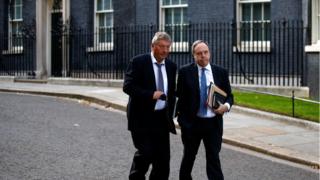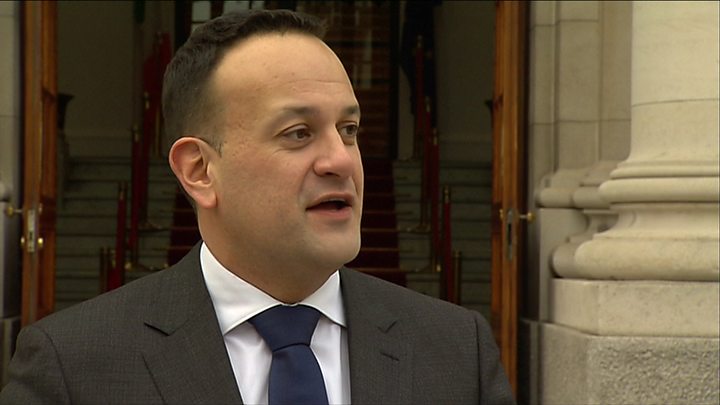Brexit: The DUP says there is 'no way' it will back PM's deal
 Image copyright
Reuters
Image copyright
Reuters
There is "no way" the Democratic Unionist Party will back Theresa May's Brexit deal, a leading figure has said.
Sammy Wilson told the BBC he was "more alarmed" than ever about what the deal would mean for Northern Ireland.
The DUP, which props up the Tory government, has held talks with the PM in recent days as she tries to persuade MPs to back the deal later this month.
The PM is seeking further legal assurances from the EU but it has said negotiations will not be re-opened.
The UK is due to leave the EU on 29 March 2019.
MPs will decide whether to accept or reject the withdrawal terms negotiated by Mrs May, as well as the framework of future relations, in a vote expected on 15 January.
The vote was due to be held in December but Mrs May postponed it after it became clear she would be heavily defeated.
In the three weeks since then, she has been appealing to EU leaders to do more to allay MPs' concerns over parts of the agreement, particularly the proposed Irish backstop.
This arrangement would see the UK tied to EU rules if the two sides' future relationship is not settled by the end of 2020, when the proposed transition period will end, or if another way is not found of preventing physical checks on the border between Northern Ireland and the Republic of Ireland.
Mrs May, who is due to speak to European Commission President Jean-Claude Juncker later, insists it is a contingency plan that all sides agree should not be needed.
But the DUP are adamantly opposed, saying it will create new barriers between Northern Ireland and the rest of the UK and could end up as the default template for future relations.

Mr Wilson, the DUP's Brexit spokesman, told BBC Radio 4's Today programme that little had changed since mid-December and his party believed the backstop was a "con trick" that was being imposed on the UK.
Asked if there was any way the party could support the PM's deal, he replied "no there is not".
"It is not just because of the regulations which Northern Ireland would be subject to with the backstop, but also the fact we would have to treat the rest of the UK as a third country and we would not participate in any trade deals which the UK may enter into the future".
On Thursday, Irish Prime Minister Leo Varadkar said the border issue was the only "red line" his country has had in the Brexit negotiations and that would not change.
While he and other EU leaders were prepared to offer assurances and clarifications to help Mrs May get the agreement through Parliament, he said it has "to be a proposal that we can accept".
"It can't be a proposal that contradicts what is already in the withdrawal agreement," he said. "It can't be something that renders the backstop inoperable, for example."
The DUP have said talk of the return of a hard border on the island of Ireland is "nonsense propaganda", since neither London nor Dublin wants it or is willing to construct the infrastructure.
Mr Wilson said NI businesses should not be scared by the prospect of leaving without a deal despite warnings from British ministers that it could lead to big tariffs on food exports.
"If anyone should be worried about the tariffs on beef and sheep then it should be the Irish because, of course, we, the United Kingdom, are net importers of food," he said.
The BBC understands that up to 40 Conservative MPs are likely to vote against the Brexit agreement even if Mrs May secures further concessions on the backstop.
This would mean almost certain defeat for Mrs May, since Labour, the Lib Dems and the SNP have all vowed to vote against the deal.
Many Tory members of the European Research Group remain opposed to the UK handing over £39bn, as part of the proposed financial settlement, in return for what they say are vague promises over future trading terms.
New research also suggests opposition to Mrs May's deal among Conservative party members.
A survey of 1,215 Tory members, conducted by Queen Mary University and Sussex University, found 57% would vote to leave without a deal in a future referendum, compared with 23% who support the current deal and 15% who would prefer to remain in the EU.